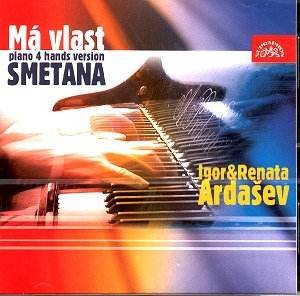The Ardaševs play beautifully together — one
is reminded of other excellent husband and wife teams such as
‘Alexander and Dakin’ and Ingeborg and Reimer Küchler. In
addition, they make a striking looking couple, with Igor tall
and stoic with Renata having exquisite
large blue-grey eyes and long tawny hair. Igor studied with Paul
Badura-Skoda and Rudolf Serkin, then won fifth place at the Moscow
Tchaikovsky Competition as well as an amazingly long list of other
honours. Renata studied at the Janáček Academy of
Music and accumulated her own collection of medals before winning
the International Chopin Competition and the Gordon Trust Prize
in Glasgow.
Hearing this new version of this familiar and
beloved music is so exciting to me that I’ve been playing this
disk over and over all afternoon. The usual problem in performing
this work is that the musical and dramatic climax is reached with
#2, The Moldau, with a secondary climax with #4, From
Bohemia’s Meadows and Forests. After that, most orchestral
conductors let the intensity of the music fall off. The Ardaševs
do a great job of re-building intensity toward the end of #6,
Blaník, (Track 6) when Smetana brings the themes
of all the poems together in a rich counterpoint to provide a
grand coda. In orchestral recordings, only Vaclav Smetacek in
1981 was able to do so well.
Incredible it is to imagine that Smetana was
completely deaf before he began work on Ma Vlast and never
heard a single note of it.
These guys do a terrific job with all this, and
the impact of the performance is all the greater because it becomes
almost a chamber duet. The piano does not have the sweetness nor
the dynamic range of a full orchestra, of course, so the fugue
in #4 (Track 4) cannot be so hushed and mysterious as it is in
a good orchestral performance. Nor can the piano sing the Big
Tune of The Moldau (Track 2) so grandly as a big orchestral
string section. But what we gain is the intimacy of just two performers
who can play the work with a personal expression that makes an
orchestra sound like a clumsy, clunking machine. Phrases can be
shaped, inner voices clarified and rhythms accented beyond the
capability of any orchestra. For instance, many orchestral performances
get the timing wrong on the pizzicato violin accents in
the first ten bars of #2 whereas the Ardaševs get it exactly right,
of course. And they achieve more ominousness and spookiness in
the beginning of Tábor (Track 5) than I’ve ever
heard before.
Anyone who loves this music will want this recording
to sit beside their favourite orchestral version.
Paul Shoemaker
